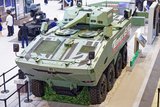Latvia relaunches tactical vehicle procurement
The Latvian Ministry of Defence (MoD) is making another attempt to procure a fleet of tactical vehicles. This comes after the previous competition, which saw the selection of Sisu's GTP 4x4, had to be terminated due to the discovery of a number of irregularities in the evaluation process.
News of the new tender was released in early October 2019 after an evaluation of technical and tactical requirements of the country’s armed forces. It will lead to the procurement of an unspecified number of 4x4 and 6x6 tactical vehicles. The acquisition programme will be finalised through a government to government agreement.
‘Currently,
Already have an account? Log in
Want to keep reading this article?
More from Land Warfare
-
![US DoD task force’s DroneHunter acquisition lays groundwork for Replicator 2 CUAS strategy]()
US DoD task force’s DroneHunter acquisition lays groundwork for Replicator 2 CUAS strategy
As the US Department of Defense looks to counter the growing threat of uncrewed aerial systems to improve homeland security, the DroneHunter acquisition could point to future commercial innovation.
-
![Norway opts for Hanwha’s Chunmoo for long-range fires under $2 billion deal]()
Norway opts for Hanwha’s Chunmoo for long-range fires under $2 billion deal
The selection of Hanwha’s K239 Chunmoo long-range precision fires system, with a contract expected to be signed on 30 January, makes Norway the second European country to choose the system. It is expected an operational system will be in service within four years.
-
![Land forces review: Tanks, trucks and IFVs dominate but woes remain for Ajax]()
Land forces review: Tanks, trucks and IFVs dominate but woes remain for Ajax
This year has begun with main battle tanks taking the lead while orders for large logistics and support vehicles continued from last year. Additionally, two of the British Army’s most significant contracted vehicle programmes, Ajax reconnaissance vehicle and Challenger 3 tank, continued to make news in January.























